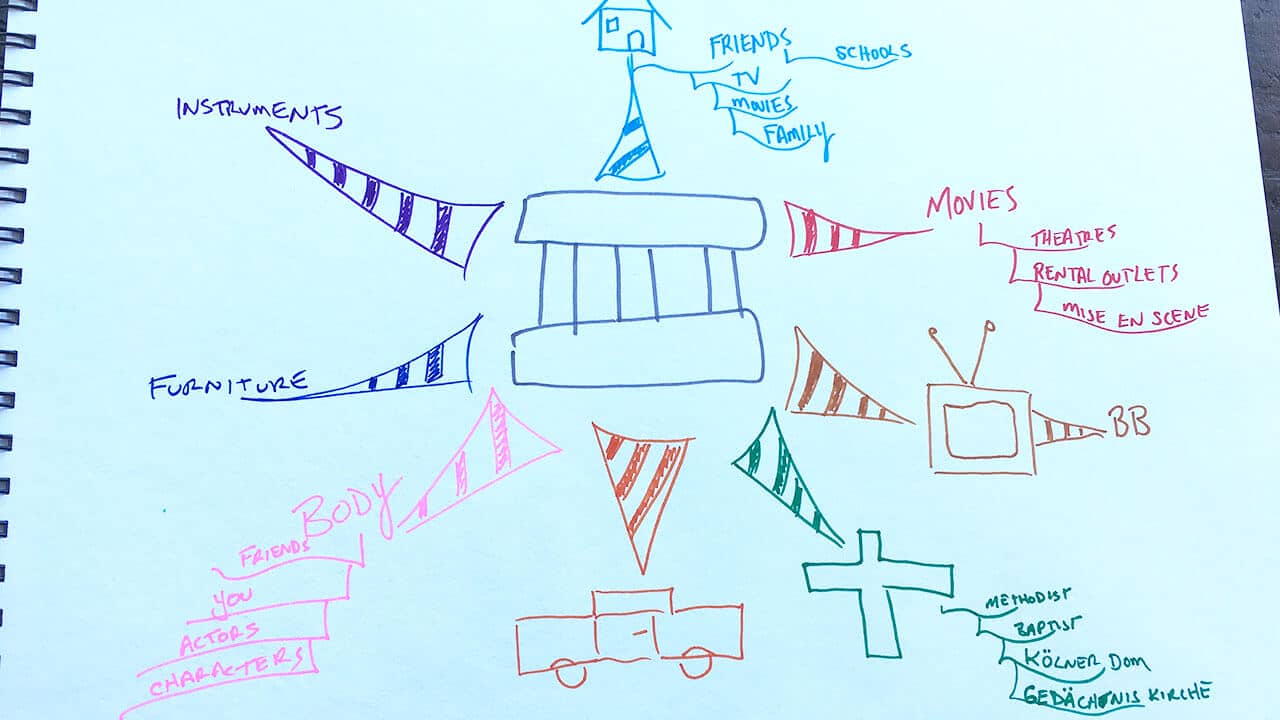Podcast: Download
Subscribe: Apple Podcasts | RSS

Strategic repetition.
Now, I realize you’ve come to this blog about memory techniques to get rid of repetition.
I’m sorry. That’s not how it works.
We always need to repeat what we want to remember. In fact, why remember something at all if you don’t need to repeat it?
The key differences with strategic repetition vs. rote repetition are these. Strategic repetition is always:
- Fun
- Creative
- Skills boosting
- Scientifically proven
Even if some repetition will always be necessary for learning, it doesn’t have to be painful. And you often won’t have to repeat nearly as much if you get it right.
So if learning how to retain knowledge in ways that are engaging and stimulating strikes you as a good thing, stick around. On this page, we’re taking a deep dive into ways to retain information that you’re going to love.
Why Can’t I Retain Information? The Surprising Truth
The reason why most people can’t retain information is that they simply haven’t trained themselves to do it.
That means it’s not IQ.
It’s not genes.
It’s not laziness.
It’s simply learning how to use memory techniques and then practicing them consistently.
When I took up memory training to combat my own issues with retaining information, it wasn’t immediately easy.
In fact, I started training my memory for better memory during some hard times I went through in grad school.
Despite fighting depression and deadlines, I was delighted by how quickly I started remembering the complex details related to my PhD. I was even more delighted when I used the same techniques to help me learn languages and start a career.
Since then, I’ve helped thousands of people since and I am confident the retention tips I have to share will help you too.
We can take it a step further:
People who can’t learn quickly and recall information on demand not only fail to use memory techniques. They haven’t trained their procedural memory so that they can use mnemonics almost as if on autopilot.

You see, anyone can learn about memory techniques. But without practicing them consistently enough so they become second nature, all that information is just data.
The science here is very simple. We’re basically looking at five kinds of brain processes that you just need to link together:
- Encoding information strategically using elaborative encoding
- Decoding information strategically using active recall
- Serial positioning with the primacy effect and recency effects
- Habit formation so that you start using the strategies automatically
- Using scientifically valid chunking methods to group and review information
We’ll pick up each of these scientific matters in greater detail as we go along. With each tip I’ll share, you’ll discover simple ways to harness the power of each principle both for your studies and using mnemonics in everyday life.
How to Retain Information Quickly: 14 Proven Study Tips
1: Use Exaggerated Associations
The fancy, scientific term for using exaggerated association is “elaborative encoding.”
But you might be wondering… what is an association?
Good question. It’s one of the most powerful mnemonic devices you can use.
Basically, you’re going to look at the target information and find something you can connect to it.
For example, if you need to memorize someone’s name, you’ll look at the first couple of letters. When I met someone with the complex name Gangador Dianand, I imagined a “gang” first.
Next, I associated that sound with a rap band known to dress as gang members. Then I had them bang on a door.

That’s the association part. The elaborative encoding part is when you imagine those gang members larger than life and hear the sound of that banging extremely loud. (In your imagination, of course.)
To take another example from one of my students in the Magnetic Memory Method Masterclass, Michael Wild shared how he passed his hazardous materials exam:
It’s the exact process Michael described in the video above. It’s the exaggerating the association that makes it so memorable. And that’s what helps with the next tip. Because as Michael discusses, it was placing the images in Memory Palaces that made all the difference in the end.
2: Use a Memory Palace
When you want to retain info, you need to revisit it. You can do that using flashcards or Anki, but typically the Memory Palace technique is preferable.
This special mnemonic device is just a mental recreation of a building you’re familiar with and can easily bring to mind. After elaborating information, you place it in this mental device and then revisit it strategically to usher the information into long-term memory efficiently.
Here’s an example:
Let’s say you need to memorize some details on a map. If you use Natalie Portman and Art Spiegelman to memorize that Spain and Portugal share a border.
First, you exaggerate an interaction between them. Then you place that association in a room.
Later, to practice what memory neuroscientists like Boris Konrad call “active recall,” you revisit that area in the room and simply ask yourself:
What was happening there?
If you’ve made your association exaggerated enough, your two characters should come to mind. The spelling of their names should trigger the target information.
And yes, this strategy is scientifically proven. Studies have shown that when you put down your textbook and practice recalling information you’ve elaborated, you will improve your ability to recall it better.
For a more complete case study of the Memory Palace technique, I encourage you to go through this tutorial on how I memorized my TEDx Talk. Using Google maps, I actually take you onto the exact street in Brisbane I used to commit the speech to memory and retain it:
Although it’s been years since I gave the talk, I’m confident I could reconstruct most of it right now if you asked me to the same way I can recite countless Sanskrit phrases. The Memory Palace technique works that well and that’s why it has remained so popular for thousands of years.
3: Test Yourself Strategically
In order to properly benefit from active recall, it’s important that you test yourself.
Unfortunately, a lot of people cheat. They try recalling the information for a second or two, and then give up, exposing themselves to the answer.
That’s called rote repetition. It’s painful, boring and rarely helps with retaining information. You want to use the best possible mnemonic strategies instead.
However, if you have a journal or piece of paper in front of you and the target information is nowhere in sight, cheating is impossible.
Then, when you write out what you memorized using exaggerated association, you get the benefits of active recall.
Even if you make mistakes, you’ll still train your short-term and long-term memory to work better. Over time, you’ll get stronger and stronger.
One case of self-testing I admire very much was sent to me by my student, Matt Barclay.
He didn’t wait for perfection to get in front of an audience and test what he’d memorized. He used the self-testing demonstration as part of the learning process.
Along these lines, please consider self-testing in the context of deliberate practice.
This fancy term indicates a specific way of continually showing up to grow your skills. This form of practice is as important in retaining information for the long-term as it is for any skill. That’s because your memory is a performance-based feature of your mind. If you can’t retain information, it’s just a sign that you need not just more practice, but optimized practice of the kind only self-testing can bring.
4: Interleave
A lot of people “force” themselves to get through one book at a time.
I have a PhD, two MAs and a BA and I can tell you this:
I never do this.
Instead, I take many breaks while reading or taking courses and strategically “interleave” my study material.
This scientific term means that you take breaks often and switch things up. By reading more than one book at a time, you switch from a focused state to the “diffuse mode,” which gives your brain space to remember more.
The research on this goes back at least as far as Karl Duncker who wrote a book about the psychology of productive thinking back in 1935.
More recently, Barbara Oakley has featured contemporary data that substantiates these findings in her famous course, Learning How to Learn.
(Dr. Oakley’s course is also a printed guide and one of the 3 best speed reading books in the world.)
5: Use Proper Reading Techniques
I just mentioned speed reading, but be careful. There’s a lot of garbage you’ll come across in that world.
For example, most of what you’ll read about reducing subvocalization is a farce. Worse, skimming vs scanning strategies are usually poorly understood.
The broad strokes of learning how to read faster boil down to this:
- Have goals, missions and systems that help you frame and stick with a focused reading program
- Learn to use “priming”
- Extract information strategically (see How to Memorize a Textbook)
- Use memory techniques to recall the information
- Make sure you test yourself using the active recall strategy discussed above (without cheating)
6: Improve Your Reading Comprehension Skills
The first way to understand better is to change your definition of comprehension.
Many people toss their hands up in the air the instant something doesn’t make sense—like in the process of learning a new language or a difficult subject.
This is an incorrect approach because we read challenging material so that we might understand better. Without challenge, there is no growth.
Instead, learn the best reading comprehension strategies and practice them consistently. For example, I used to look up on charts and grafts and give up on them completely.

Now, I draw them with my own hand to understand them better. This step is essential because not only do I understand them better. I also remember more.
7: Mind Map
Mind mapping helps you retain information, especially when you revisit your maps strategically.
For example, Phil Chambers has given the excellent suggestion that you revisit each map at least ten times. Leave a Roman Numeral each time you review it so you can remember where you are at in your spaced repetition sequence.
This simple reviewing strategy has been endorsed by Rohan Jotwani, a former Admissions Committee Member at Columbia University. To improve your test taking skills, he advises that you “set up a study schedule that won’t overwhelm you.”
Creating, reviewing and using Chambers’ suggestion to track your review sessions is definitely a great way to reduce overwhelm and doable by anyone studying any topic.
But… what is mind mapping? Unlike concept mapping, it’s a graphical means of simplifying key ideas using colors, images and keywords.
Let’s say you want to memorize words in a foreign language. A mind map is a great way to do it. I rapidly retained information about cooking in German, for example:
Mind mapping works as one of the best ways to retain information if you optimize it for that purpose. So I suggest using the Phil Chambers tip I just shared to make that happen.

Here are more mind map examples you can model. You can also check out how I’ve used mind mapping to develop my business. I have to retain all kinds of information in order to succeed on the market, but in business, maintaining the vision and remembering why I got into business in the first place is key.
Frankly, there are so many benefits to mind mapping, I had to write a complete tutorial to list them all out. If you’re not currently mind mapping, I suggest adding it as a learning strategy a.s.a.p.
8: Write Summaries
We know that we need active recall to remember quicker and with greater longevity. But we also need to percolate information and make connections.
Writing summaries is one of the best ways to do that. And it doesn’t have to take long.
I suggest keeping a notebook just for summaries of your reading. Commit at least half a page for each book you read and pour out what you remembered in at least 2-5 sentences.
You can write even shorter summaries too. As I share in this Zettelkasten case study, I often write very minimally on index cards to start the process of ushering information into my memory.
With a small amount of practice, the simple habit of writing summaries will become a portal to remembering a lot more, much faster. And the best part is that creating summaries helps with making connections between different books you read as well.
One of my favorite, but more elaborate ways to retain information for longer is to write a book. Obviously, not everyone wants to write and publish, but it’s worth understanding that writing about what you read is a key strategy for retaining more. That’s why schools give essay assignments, after all.
9: Group Discussion
As with summarization, a great way to practice active recall is to speak with others about what you’re reading.
Frankly, I’m puzzled by why people would read anything they weren’t going to have conversations about. But it happens.
If you’re having trouble remembering what you read, join discussion forums. Go to meetup groups. Or just run past the ideas from what you’re reading with friends.

If you really can’t find others to converse with, speak the key points out loud, either to a pet or to yourself in the shower. The point is to verbalize what you’ve read in your own words. This helps you remember much faster and without a ton of repetition.
10: Meditate Your Way To Better Memory
It might seem like meditating is far flung from improving your memory.
However, many studies show just how profound meditation is for concentration and focus. Others show how people of many different ages experience improved recall from just four short meditation sessions per week.
Add yoga to the mix for more scientific proof that these traditions prove the best way to retain information without having to learn a bunch of memory techniques.
11: Study Your Personal Rhythms To Maximize Them
I know a guy who used to beat himself up for not being a morning person.
In When: The Scientific Secrets of Perfect Timing, Daniel Pink reveals the conclusions from over 700 studies.
It turns out that only 15% of the population performs well during the morning.

This means that a huge percentage of people would learn better at different times of day, including later in the evening. In fact, some people remember far more when they study before bed.
How do you find out?
Experiment and track your results.
If you’re willing to keep a journal for a few weeks, you can work out your optimal times for learning and choose them.
Of course, there’s a catch. (Isn’t there always?)
Your best times of day can and probably will change as you age or as factors around you evolve.
This means you’ll want to keep testing and journaling while being willing to pivot throughout your life.
12: Create Emotional Connections As You Learn Or Encounter New Information
As you probably already know, we humans remember stories incredibly well. There’s a simple reason why: the movies we watch and the novels we read are loaded with the core human emotions. As Sarah-Jane Murray puts it in this TEDx talk, we are “wired for story.’
When you are learning information, especially when it’s difficult, it’s important to tap into this fundamental feature of how humans learn.
How?
Well, in the world of mnemonics, there’s something called the story method. When I was first learning about a whole realm of non-classical logic called “Dialetheism,” I imagined Princess Diana and Dracula and had her dialling a phone in a panic. I poured as much emotion into the image as I could in order to make the sound of the word stick.
13: Teach Others
They say that teaching involves learning twice.
And explaining what you’ve learned to others is one of the most important things you can do to help your brain remember what you’re learning.
But please don’t get hung up on the strict meaning of the word “teach.” You don’t have to assemble a class.
You can just grab a family member or friend and explain what you’ve been learning. Ideally, you’ll write out the different steps or aspects that characterize the information in advance so you can explain it in a structured way.
You wouldn’t be wrong if you think this tip is a repetition of engaging in group discussion and writing summaries. But it’s not quite the same thing.
If you look at the image above, I’ve just finished giving a memory demonstration at a business meeting in Brisbane. Then I started teaching how to use memory techniques.
Memorizing everyone’s names was one skill. Preparing and delivering a discussion about how the memory techniques work uses a completely different part of the mind and I’ve learned so much about memory precisely because I not only teach the material. I spend time preparing what I explain to others.
I did this as a Film Studies professor and back when I had bass guitar students. Teaching others is a fantastic strategy for increasing how much your brain can contain because you think very differently about the information by imagining how it will be best received by others.
14: Take Care Of Your Health
I probably should have started with the point about managing your physical being.
By the same token, I think most of us know that the human brain and memory cannot operate will if it isn’t in good shape. Countless scientific studies like this one show that physical health is a must.
The big picture health aspects you need to work on to start improving information retention include:
- Giving yourself plenty of memory-friendly sleep because that’s when your brain processes and consolidates information
- Find ways to manage your stress
- Keep hydrated
- Exercise at least a few times a week
- Eat foods proven to improve memory
- Socialize often to discuss what you’re learning
When you take care of each of these aspects, you’ll be able to study smarter almost every time.
But we all go through periods of disruption, so be kind to yourself when you slip. Practice getting back into action. This act of resilience will help you avoid distractions from your health plan in the future.
The Ultimate Tip For Retaining Information
Another word for the willingness to pivot is “flexibility.”

When you combine all the tips I’ve shared with you today, your memory is going to be incredibly flexible. And it will always trend towards higher and higher levels of improvement, even as you age.
Since most of us want to be lifelong learners, this should not be an issue.
Keep practicing the approaches I’ve shared on this page. The more you explore, the more you’ll discover even more interesting and powerful ways to make learning easier and fun.
After all, the more you can remember, the more interesting and fun things become. And the more you learn, the more you can learn. That’s thanks to the power of connection, which is truly the most rewarding memory technique we’ve got.
So what do you say? Are you excited to get out there and learn more using enhanced memory abilities?
If so, why not grab this free memory improvement course and learn more about how to improve your ability to recall information over the long term?
Related Posts
- How To Remember Passwords: 7 POWERFUL Tips
Learning how to remember passwords is fun and easy. Learn the most powerful memory tricks…
- Simonides of Ceos: 7 POWERFUL Memory Palace Tips
Was Simonides of Ceos the father of the Art of Memory? No, but the tips…
- How to Improve Memory for Studying (9 Powerful Tips)
Want to know how to improve your memory for studying? From the Memory Palace technique…









